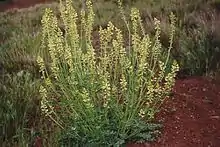| Shivwits milkvetch | |
|---|---|
 | |
| Scientific classification | |
| Kingdom: | Plantae |
| Clade: | Tracheophytes |
| Clade: | Angiosperms |
| Clade: | Eudicots |
| Clade: | Rosids |
| Order: | Fabales |
| Family: | Fabaceae |
| Subfamily: | Faboideae |
| Genus: | Astragalus |
| Species: | A. ampullarioides |
| Binomial name | |
| Astragalus ampullarioides | |
Astragalus ampullarioides is a rare species of milkvetch known by the common name Shivwits milkvetch. It was previously classified as a variety of Astragalus eremiticus.[2] It is endemic to Washington County, Utah, where it is known from only seven populations.[2] Estimates of the total number of individuals range from 1000[1] to 4200.[3] The species occurs in desert scrub and woodlands on the Chinle Formation.[4] It is a federally listed endangered species.[5]
This is a perennial herb growing erect to a maximum height near half a meter. It produces about 45 flowers on an erect inflorescence.[4] It is pollinated by bees.[2]
Much of the plant's range is within the bounds of Zion National Park and Shivwits tribal lands.[4] Other parts of the range are unprotected. Threats to the species include habitat loss to development and agriculture, herbivory by rabbits, cattle grazing, off-road vehicles, quarrying, and introduced plant species.[1][4]
References
- 1 2 3 "The Nature Conservancy". Archived from the original on 2002-11-23. Retrieved 2011-01-17.
- 1 2 3 Breinholt, J. W., et al. (2009). Population genetic structure of an endangered Utah endemic, Astragalus ampullarioides (Fabaceae). American Journal of Botany 96 661.
- ↑ Zion National Park
- 1 2 3 4 Center for Plant Conservation Archived December 15, 2010, at the Wayback Machine
- ↑ "Species Profile for Shivwits milk-vetch (Astragalus ampullarioides)". ecos.fws.gov. Archived from the original on 2016-12-30.
